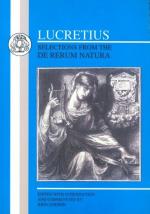|
This section contains 5,038 words (approx. 17 pages at 300 words per page) |

|
SOURCE: Kaufman, Frederik. “Death and Deprivation; Or, Why Lucretius's Symmetry Argument Fails.” Australasian Journal of Philosophy 74, no. 2 (June 1996): 305-12.
In the following essay, Kaufman rejects Lucretius's argument of symmetry between the times of pre-life and post-death because the former does not fulfill deprivation requirements.
Assuming that death is the permanent extinction of conscious personal existence, the natural reaction to one's impending death is dismay. Under normal conditions, our death is seen as a dreadful thing, a great evil to be avoided. But a number of philosophers, including, perhaps most famously, Epicurus, have challenged the natural attitude toward death. Epicurus argues that death is not bad, because when dead one does not exist, and since nothing bad can happen to someone who does not exist, death should not be feared, at least not by a rational person.1
Epicurus' argument, though provocative, fails to convince because it seems that a...
|
This section contains 5,038 words (approx. 17 pages at 300 words per page) |

|


